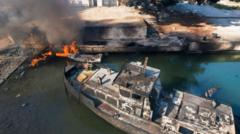**Israel intensifies military actions in Syria targeting naval vessels and strategic sites in response to shifting control in the region.**
**Israel Strikes Syrian Naval Fleet Amid Regime Shift**

**Israel Strikes Syrian Naval Fleet Amid Regime Shift**
**IDF Launches Attacks to Neutralize Military Threats Following Assad's Ouster**
Israel has confirmed its military operations against Syria's naval fleet, citing a need to dismantle threatening military assets in light of the recent fall of the Assad regime. The Israel Defense Forces (IDF) reported that their ships targeted the ports of Al-Bayda and Latakia on Monday night, where around 15 vessels were docked. Verified videos by the BBC depicted significant explosions at the Latakia port, revealing extensive damage to both ships and the surrounding area.
The IDF has conducted over 350 air strikes across Syria, coupled with the movement of ground forces into the demilitarized zone adjacent to the occupied Golan Heights. The UK-based Syrian Observatory for Human Rights (SOHR) indicated that more than 310 attacks by the IDF were recorded since the rebellion ousted the government on Sunday.
Israeli Defence Minister Israel Katz stated that the operations aimed to "destroy strategic capabilities threatening the State of Israel," declaring the naval fleet operation a considerable success. Targets included airfields, military vehicles, anti-aircraft systems, and various weapon depots in key locations such as Damascus, Homs, and Tartus. The IDF emphasized its intent to prevent weapons from reaching extremist factions.
In a video message, Prime Minister Benjamin Netanyahu warned the recently empowered Syrian rebel faction, Hayat Tahrir al-Sham (HTS), of a "forceful response" should they enable Iranian forces to regain a foothold in Syria. Netanyahu publicly expressed his hope for peaceful relations with the emerging Syrian government while framing Israeli actions as defensive maneuvers.
Rami Abdul Rahman, SOHR’s founder, commented on the severe implications of these strikes, asserting that they have effectively dismantled "all capabilities of the Syrian army." The IDF has also confirmed troop operations beyond the established buffer zone, which has been the source of tensions.
Despite assertions of maintaining a defensive posture, NATO has labeled the Israeli military's presence and actions within Syria as offensive. Turkey’s foreign ministry criticized Israel's entry into the buffer zone, accusing it of perpetuating an "occupying mentality" during a crucial time for Syria’s stability.
This buffer zone, originating from a truce in 1974, was intended to separate Israeli and Syrian forces following Israel's occupation of the Golan Heights, which was officially annexed in 1981, although this annexation remains unrecognized internationally aside from a unilateral acknowledgement by the United States in 2019.
Israeli Foreign Minister Gideon Saar emphasized that the actions against targets like chemical weapons storage and long-range missiles were essential for the defense of Israeli citizens. As tensions rise, the UN's chemical weapons watchdog has urged Syrian authorities to secure any suspected stockpiles of chemical weapons amid the ongoing conflict.
With the military situation evolving rapidly, the international community watches closely as Syria navigates this unprecedented transition, with insights still emerging from the ground.
The IDF has conducted over 350 air strikes across Syria, coupled with the movement of ground forces into the demilitarized zone adjacent to the occupied Golan Heights. The UK-based Syrian Observatory for Human Rights (SOHR) indicated that more than 310 attacks by the IDF were recorded since the rebellion ousted the government on Sunday.
Israeli Defence Minister Israel Katz stated that the operations aimed to "destroy strategic capabilities threatening the State of Israel," declaring the naval fleet operation a considerable success. Targets included airfields, military vehicles, anti-aircraft systems, and various weapon depots in key locations such as Damascus, Homs, and Tartus. The IDF emphasized its intent to prevent weapons from reaching extremist factions.
In a video message, Prime Minister Benjamin Netanyahu warned the recently empowered Syrian rebel faction, Hayat Tahrir al-Sham (HTS), of a "forceful response" should they enable Iranian forces to regain a foothold in Syria. Netanyahu publicly expressed his hope for peaceful relations with the emerging Syrian government while framing Israeli actions as defensive maneuvers.
Rami Abdul Rahman, SOHR’s founder, commented on the severe implications of these strikes, asserting that they have effectively dismantled "all capabilities of the Syrian army." The IDF has also confirmed troop operations beyond the established buffer zone, which has been the source of tensions.
Despite assertions of maintaining a defensive posture, NATO has labeled the Israeli military's presence and actions within Syria as offensive. Turkey’s foreign ministry criticized Israel's entry into the buffer zone, accusing it of perpetuating an "occupying mentality" during a crucial time for Syria’s stability.
This buffer zone, originating from a truce in 1974, was intended to separate Israeli and Syrian forces following Israel's occupation of the Golan Heights, which was officially annexed in 1981, although this annexation remains unrecognized internationally aside from a unilateral acknowledgement by the United States in 2019.
Israeli Foreign Minister Gideon Saar emphasized that the actions against targets like chemical weapons storage and long-range missiles were essential for the defense of Israeli citizens. As tensions rise, the UN's chemical weapons watchdog has urged Syrian authorities to secure any suspected stockpiles of chemical weapons amid the ongoing conflict.
With the military situation evolving rapidly, the international community watches closely as Syria navigates this unprecedented transition, with insights still emerging from the ground.























